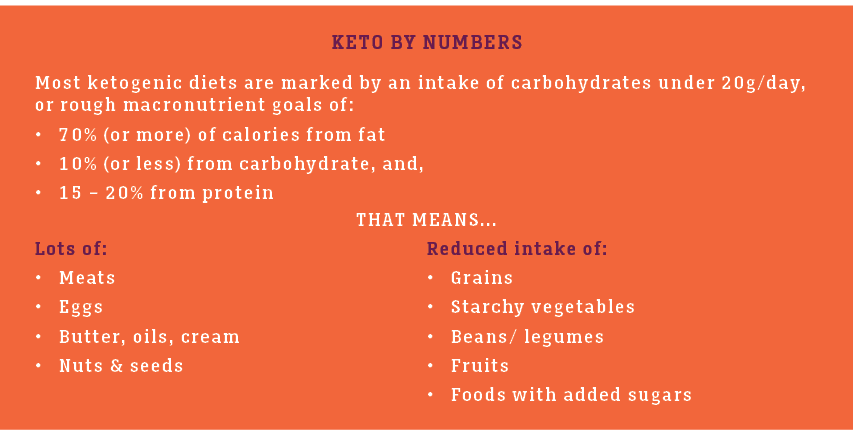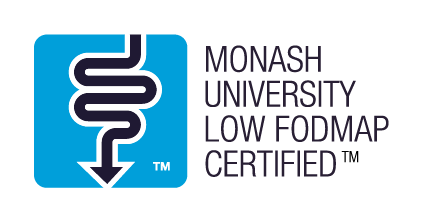
You’ve probably heard the Keto diet mentioned a fair bit lately, online, in magazines, and all over social media.
The Keto diet has grown in popularity over the last few years thanks in large part to its A-list celebrity followers. But there are other reasons for its resurgence including relatively straightforward guidelines, the potential health benefits, and because we are being shown a lot of images with ‘after’ results.
We figured it was time to take a step back, look at what the Keto diet actually is, and what medical literature is saying about it. So read on & find out more.
What is the Keto Diet?
Originally created in 1921 by physician, Russel Wilder, from the Mayo Clinic, the ketogenic diet (or keto diet for short) is a high fat, low carbohydrate diet with moderate amounts of protein
It involves dramatically reducing your carbohydrate intake and replacing it with fat. This reduction in carbs puts your body into a metabolic state called ketosis. This depletion of carbs forces the liver to metabolize fat and convert fatty acids at a high rate to produce ketones to be the main source of fuel for the brain.

Check out the full article here.
Types of Keto Diets
There’s more than just the one keto diet. In fact, there’s four types which are each for different purposes:
- The Standard Ketogenic Diet (SKD) – Best for beginners, fat loss & therapeutic purposes
- The Targeted Ketogenic Diet (TKD) – Best for workout performance
- The Cyclical Ketogenic Diet (CKD) – Best for bodybuilders & athletes
- The High Protein Ketogenic Diet (HPKD) – High protein needs
There’s a lot of info out there about each, including a great breakdown that can be found here. For this blog post, we’ll stick to looking at the keto diet at a whole, but this is something to look into when you want some more reading.
Positives of the Keto Diet
There is considerable literature published about high-fat, low-carb diets and the Keto diet specifically, many of which have shown a range of benefits linked to following the Keto diet.
Keto for Weight Loss
The Keto diet has been shown not only to be an effective way to lose weight (1, 2, 3) while maintaining muscle mass (4), but has also been shown to be more effective than a low-fat diet (5, 6), commonly prescribed by medical practitioners.
One of the most attractive features of the Keto diet is that people can lose weight without having to count calories or closely track food intake. Let’s consider that a win.
Keto and Diabetes
There is a strong link between type 2 diabetes, prediabetes & metabolic syndrome, and excess fat on the body (7, 8) which makes the Keto diet’s ability to aid in weight loss a key factor in helping manage this.
The Keto diet has also been shown to help improve insulin sensitivity by as much as 75% (9).
Other Potential Benefits
There are a range of other potential health benefits linked to the Keto diet that have been identified with respect to a variety of health conditions:
- Epilepsy – adopting a ketogenic diet has been shown to cause significant reductions in the frequency of seizures in epileptic children (10).
- Polycystic ovary syndrome (PCOS) - The ketogenic diet may help reduce insulin levels, which may play a key role in polycystic ovary syndrome (11).
- Heart Disease – risk factors such as body fat, heart disease, cholesterol, blood pressure and blood sugars can be improved (12, 13)
- Alzheimer's Disease - The keto diet may slow the progression of Alzheimer's disease and reduce its symptoms (14, 15, 16)
- Acne - lower insulin levels and eating less sugar or processed foods may help improve acne (17).
While there are a range of potential benefits of the Keto diet that have been identified it is important to note that these are not conclusive findings. These studies are often completed under controlled settings and with constant medical supervision and checks.
Things to keep in mind
Following any diet that restricts or changes your consumption of food groups will always have an effect on your body and can cause side effects.
The ‘Keto Flu’, also known as the ‘carb flu’, was named to describe the most common set of symptoms experienced when first starting the keto diet.
The symptoms can feel similar to having the flu and are caused by the body adapting to its new diet with very few carbs. While not all experience symptoms, it is common that people will experience at least some of them which include:
- Headaches
- Irritability
- Weakness
- Muscle cramps
- Muscle soreness
- Stomach pain
- Nausea
- Vomiting
- Constipation
- Diarrhoea
- Dizziness
- Poor concentration
- Difficulty sleeping
- Sugar Cravings
Apart from the symptoms, it’s important to remember that everyone is different and will have different requirements for their health and diet, which are guided by a broad range of factors. That means that the ketogenic diet is not going to be right for everyone.
Our Two Cents
As many of you would know by now, we’re big fans of the Australian Guide to Healthy Eating as they promote a balanced diet that contains all food groups. We follow these guidelines when creating our meals to ensure that we achieve a healthy balance and stick to healthy macro levels
The ketogenic diet kind of works counter to this approach as it encourages that restriction of your intake of certain food groups (primarily carbohydrates), and the increase in consumption of some.
We always recommend chatting to an Accredited Practicing Dietitian before starting any new diet, as they can make recommendations on how to proceed in a healthy way and con monitor your health and progress throughout your journey. They will also be able to offer advice about the appropriateness of the diet for you & your circumstances.
Dineamic & the Keto Diet
Here are some low carb mains that can be tailored with extra sides to fit into a keto diet
- Mains from the Low FODMAP Range
- Korma Lamb Curry
- Butter Chicken
- Soy and Ginger Beef
- Slow Cooked Mediterranean Beef
So that’s the good, bad & ugly of the Keto diet. At the end of the day, we recommend balance above all else, but if you do feel that the ketogenic diet is for you then start by doing your research, speaking to an Accredited Dietitian, and then monitoring your progress.
Let us know in the comments if you have any tips for those thinking about giving the Keto diet a go.









